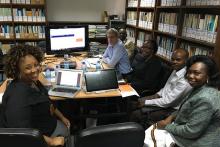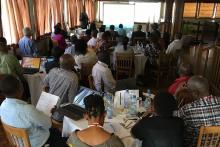WHO and partners develop a Costed National Action Plan for Health Security
Dar es Salaam, 20-23 February 2017 - This year, Tanzania made history by being the first country in the WHO African region and globally to develop a Costed National Action Plan for Health Security (NAPHS). The journey has not been easy, because it has taken over a year after the country completed the Joint External Evaluation (JEE) in February 2016. The processes of developing of the NAPHS, began in June 2016, 3 months after the JEE was completed. The NAPHS development process was started by the country’s IHR technical working group. While the focus was mainly on the JEE key findings and priority actions, other previous assessments which included the World Organization for Animal Health (OIE) Performance of Veterinary Services (PVS) assessment, the Integrated Risk Profiling Assessment, the Antimicrobial resistance (AMR) situation analysis, the integrated disease surveillance and response (IDSR) review, and the vulnerability, risk assessment and mapping (VRAM) to mention a few.
During the costing workshop, there was an important discussion about the need for a coordination platform, preferably at the Prime Minister’s Office and the creation of an inter-ministerial committee was proposed to ensure a seamless interplay between multiple sectors and other existing plans at all administrative levels of the country.
The Tanzania JEE has really galvanised multiple stakeholders to work together on health security in the country. Importantly, even at the regional and global level, the JEE and subsequently the planning and costing workshops brought together several agencies including: WHO (all three levels), the US CDC, Finland, the US department of defence, FAO, OIE, JICA, GIZ, PHE, PHE, the US department of Agriculture, the World Bank, National governments for cross fertilization. In terms of forging partnerships, it is not an over statement to say that the Tanzania JEE and NAPHS development process have created and continue to create partnerships in ways not seen before. Now that the plan is costed, the main focus turns to its implementation. Prior to implementation, and the country is planning high-level launch of the plan at the Parliamentary session in June 2017. The aim is to create public awareness including ensuring that Parliamentarians are aware and will lobby for sustained and adequate domestic funding.
___________________________________________________
For more information, please contact:
Technical contacts:
Dr. Grace Saguti; Tel: +255 754 287 875; Email: sagutig [at] who.int
Media contacts:
Dr. Neema Kileo; Tel: +255 755 551 804; Email: kileon [at] who.int
Below:
01. Ministry of Health and Partners during the costing exercise
02. Participants during the workshop


